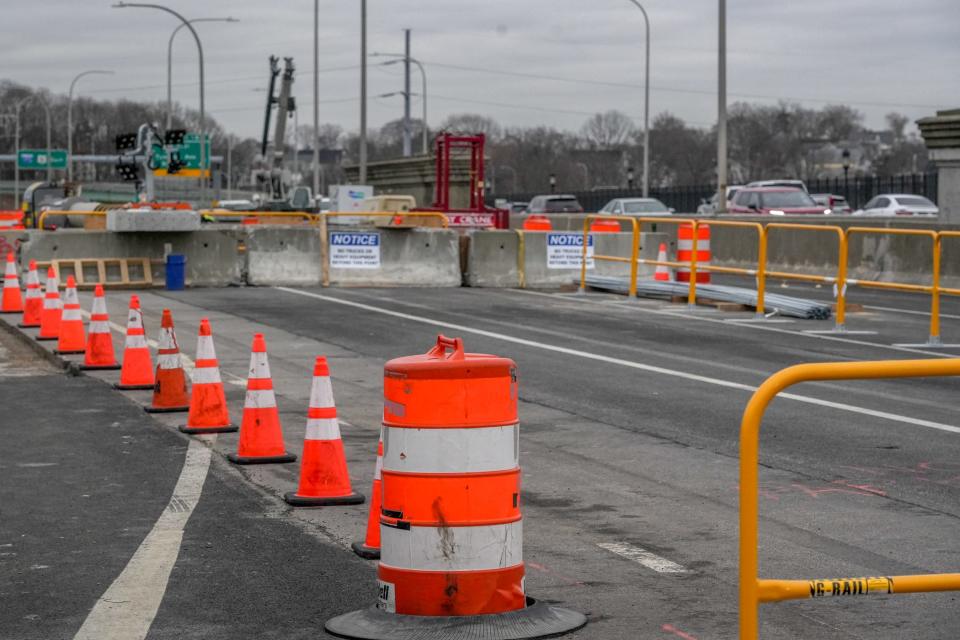RIDOT required employees connected to Washington Bridge contracts to sign NDAs. Why?
For the period of time spanning a legal fight over who would get the last big Washington Bridge construction contract, the Rhode Island Department of Transportation required its employees to sign non-disclosure agreements, also known as NDAs.
Employees involved in the review and scoring of bids, as well as recommendations on which companies should win which contracts, were required to sign a "confidentiality agreement" that said, in part:
"All documents and information relating to vendor proposals (content, budget, approach to problems, staffing) are to be kept in the strictest confidence."
"Under no circumstances are questions to be addressed to, or discussions to be conducted with vendors, members of the public, the press, State agencies, friends, relatives, business associates, or other reviewers not officially involved in the procurement process, unless authorized in writing by the Division of Purchases."
The possible consequences for violating this gag rule? "Termination from employment."

Why was RIDOT using NDAs?
RIDOT's "confidentiality" requirement had nothing to do with the #MeToo movement, which prompted years of debate and, last year, restrictions on the use of NDAs in Rhode Island.
And it went beyond more broadly written confidentiality pledges all new employees are required to sign promising not to disclose confidential information about, for example, recipients of government benefits, or preliminary drafts, impressions, memoranda or working papers of state employees.
At RIDOT, the use of NDAs has been focused on the behind-the-scenes happenings when contracts are handed out by the state agency. In Fiscal Year 2023 alone, RIDOT paid $588 million for road and bridge work, including millions spent on the construction, inspection and, now, emergency repairs to the closed westbound span of the Washington Bridge.
RIDOT not alone in using NDAs in state government
Asked if any other state agency required its employees to sign agreements akin to the gag order RIDOT imposed on its employees, Department of Administration spokeswoman Laura Hart said yes.
She said anyone involved in the review or evaluation of bids for potential contracts would have been required to sign a similar document.
"Its aim is to ensure that proprietary business information is treated accordingly, to prevent outside interference with the evaluation, and remind employees of applicable state law and regulations. The confidentiality agreement is similar to federal law and acquisition rules," Hart said.
Timeline of Washington Bridge closure: Here's how it all happened
She said the practice of requiring state employees to sign such agreements began in 2016 – Gov. Gina Raimondo's second year in office. She did not know the impetus.
The form was revised somewhat in 2019, but the copy Hart provided still bans discussions "with vendors, members of the public, the press, State agencies, friends, relatives, business associates, or other reviewers not officially involved in the procurement process, unless authorized in writing by the Division of Purchases."
Did the NDAs stifle whistleblowing?
Still among the unknowns is whether the RIDOT confidentiality requirement kept any concerned employees quiet during the sparring between Cardi Corporation and Barletta Heavy Division over a Washington Bridge contract.
Cardi was the first contractor hired to work on the bridge, but the project was paused after the temporary traffic pattern used to accommodate bridge work caused massive backups into Massachusetts.
When RIDOT rebid the project, Cardi won again, but Barletta sued, claiming Cardi had unfairly used information from its prior work to undercut other bidders.
The Federal Highway Administration refused to sign off on a contract for Cardi and, when RIDOT went out to bid again, Barletta won.
It remains unclear if the all-encompassing "no-disclosure" and "non-disparagement" agreements that RIDOT and other state agencies use are enforceable against employees who suspect wrongdoing.
In June, Gov. Dan McKee signed a long-sought new law that prohibits employers from requiring their workers to sign non-disclosure agreements that prevent them from discussing – or seeking a remedy in court – for sexual harassments, alleged violations of their civil rights and, more broadly, "alleged unlawful conduct."
“It is unacceptable that workers are being forced to sign away their rights as a condition of employment,” said Rep. Teresa Tanzi, D-South Kingstown, on the day McKee signed the prohibition on NDAs.
The new law defines an NDA as any "agreement which restricts an individual from taking any action to include, but not be limited to, speaking or publicizing information that negatively impacts the other party to the agreement to include the reputation, products, services, employees and management of the protected party."
In response to inquiries, Hart said: "The conflict of interest and confidentiality form is signed by all employees, regardless of agency, who participate in any technical evaluation committee associated with a request for proposal.
This article originally appeared on The Providence Journal: RIDOT employees connected to Washington Bridge contracts signed NDAs

